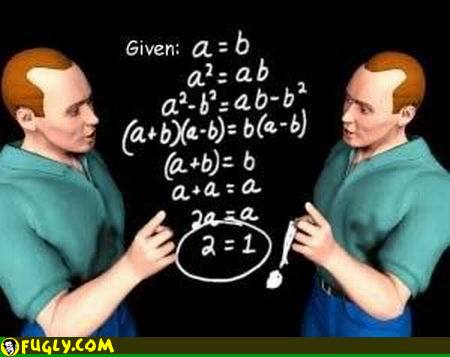The Inescapable Algebra of Life: Modus Ponens and Modus Tollens

Have you ever noticed that once you’re aware that something exists at all, suddenly you notice it everywhere? For example, after a friend shows you his nondescript new car, suddenly you see the same model car just about every time you leave the house. Same thing here: read this hub and you’ll start noticing Modus Ponens and Modus Tollens everywhere, not only in conversation but also in song lyrics, TV dialogue, political speeches, etc. That’s a good thing because knowing the rules enables you to see when they’re broken, and that can have a huge impact on how well you move through some of the more muddled situations of daily life.
Modus Ponens and Modus Tollens are basic logic constructs, probably the two most common. Modus Ponens and Modus Tollens are solid rock rules; denying the antecedent and affirming the consequent turn them into slippery stones.
Modus Ponens
If A, then B.
A
Therefore, B.
Does this sound familiar? Ya, sure it does; you’ve been using this formula since childhood, even infancy. If I cry, I’ll get attention. I cry. Inevitably, I’ll get attention. As long as there is a solid correlation between A and B – otherwise known as cause and effect – this reasoning works every time. We couldn’t survive without this basic building block; it underlies the bulk of not only science and technology but also a good part of human behavior. We like Modus Ponens!
Get your kids on a good foundation
Modus Tollens
Modus Tollen is Modus Ponen’s fraternal twin. It looks a lot like Modus Ponen, and it can be trusted every time, but it is a little closer to the Dark Side of The Force.
Here’s the formula and a simple example, followed by more complex examples from real life:
If A, then B.
Not B.
Therefore, not A.
If I kick a mean dog (A) then it will bite my leg (B.)
The mean dog did not bite my leg (not B.)
Therefore, I MUST NOT have kicked the dog (A.)
Ya, that works. Sure, the dog could have bitten my leg if I had poked him with a stick instead of kicking him, but that and all the other reasons for the dog to bite me would not have interrupted the cause and effect relationship of kicking it and being bitten. So, I might have done something else to the dog, but I definitely didn’t kick it.
Denying the Antecedent and Affirming the Consequent
Denying the antecedent makes a Modus Ponens argument invalid. Here, invalid means it might be true but cannot always be true. This is usually not very slippery because it’s relatively easy to see what makes it invalid. For example, let’s look again at the dog biting my leg.
If I kick a mean dog (A), then it will bite my leg. (B)
I will NOT kick the mean dog. (Not A)
Therefore, it will not bite my leg. (Not B)
True, on the surface. But not kicking the dog MIGHT be irrelevant - what if the mean dog’s owner commands him to attack me? I’ll still get bitten. So, merely NOT kicking it does not guarantee that I won’t get bitten. Real life situations are often more complex, subtle, or convoluted, but nonetheless, most people, if even half-way calm, can see that there might have been multiple causes for any one effect.
Affirming the consequent of a Modus Ponens argument is also pretty easy to see through.
If I kick a mean dog (A), it will bite my leg. (B)
The dog bit my leg. (B)
Therefore, I kicked the dog. (A)
But what if I had poked the dog with a stick, or thrown a big rock at it, punched it in the neck, et cetera? Just because the dog bit my leg does not mean NECESSARILY that I kicked it.
Doing either of these – denying the antecedent or affirming the consequent – of a Modus Tollens can be quite a bit harder to sort out and see through. The seduction and slipperiness lies in hiding the truth in plain sight with a double-negative. Done smoothly, quickly, or with subtlety, it is as effective as a magician’s misdirection. It also is quite common, and it runs rampant in some people’s lives, even when trying to understand their own lives. It is, however, fun and convenient to use! Hence its popularity.
It is seductive, and it is slippery. Like any good lie, there is some truth in it. But it can’t be trusted. When quick thinking is slowed down and examined just a bit more closely, most of us readily see the problem with it.
Here are the formulas:
Modus Tollens, Denying the Antecedent
If NOT A, then B.
Not B.
Therefore, not A.
Modus Tollens, Affirming the Consequent
If A, then B.
NOT not B.
Therefore, not A.
Here's Where The Algebra Comes In
Using X and Y (or A and B), what’s the formula here:
(You’ve probably heard something like this before, haven’t you?)
If you love me, you’ll do what I want you to do.
You did not do what I wanted you to do.
Therefore, you don't love me.
Similar to the way you can solve an equation for any variable ( X = 2Y + 7 is the same as Y = (X – 7)/2 ), you can manipulate the logical construct. No, the same rules do not apply, but you can add negations and parenthetical conditions, and you can reorder the parts to make an argument either transparent or confusing (i.e., misleading.) For example:
If not A, then (B and C).
A.
Therefore, not (B and C).
Right? No, I don’t think so. For one thing, DeMorgan’s Theorem tells us that NOT (B AND C) = (B OR C). And then there’s the “If not A . . . A” which takes one more, easily overlooked mental step than “If A . . . not A.” It’s getting a little complicated, isn’t it, just like . . . oh, say, real life?
What about something from life like this:
If A and (B or C) but not D, then E.
C and half of D.
Therefore, what?
Or what about a merely implied premise or presupposition?
“But Joe! We’re friends! (or siblings, or spouses, etc.) Ya gotta help me with this!”
I’ll bet some version of that one sounds familiar to most of us . . .

Lead by example: apply critical thinking to the world around us and arm your family against personal manipulation.
Without being aware of their Latin names or truth table dependability, people use Modus Ponens and Modus Tollens all the time. Just like with algebra problems, the hard part is not manipulating the equations themselves: it is setting up an accurate equation from the “word problems.” Being aware of the rules – no, the immutable laws, laws as unswerving as the law of gravity – will not automatically make your thinking clear and ironclad. It will, however, help you in that direction.
So, the next time you listen to a sales pitch, or a political argument, or a philosophical or religious explanation, or a social situation evaluation, keep your ears open for Modus Ponens and Modus Tollens. Actually, keep your ears open for denying the antecedent or affirming the consequent, because those are the buggers that can cause you trouble.
Also, the next time you’re having a discussion or (hopefully civil) argument, when you’re listening for logic, don’t forget to listen carefully to the words that come out of your own mouth and the thoughts in your head. Remember, the algebra of life is complex and subtle, and logical fallacies are not only just as complex and subtle but also slippery and seductive – just like the Dark Side of the Force.
And over it all, going from Star Wars to Star Trek, as Mr. Spock said in one of the Star Trek movies, “Logic is only the beginning of wisdom.”
I’ll close with a question:
Why isn’t this taught in high school?










